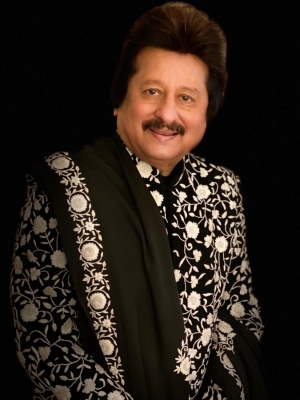IANS Obituary: From not wanting to sing ‘Chitthi’ to mentoring John Abraham, a melodious life lived well
Mumbai: Pankaj Udhas earned his first accolade as a singer when he was 11 years old.
He sang the patriotic song ‘Ae mere watan ke logon’ at a public event in his hometown Rajkot when the Sino-Indian War was raging in 1962, and he so impressed a member of the audience that he gifted the young singer what was then a princely sum of Rs 51.
Udhas, who passed into eternity on Monday, February 26, at the age of 72, however, had not planned to become a singer. He was training to play the tabla at the Sangeet Natya Academy in Rajkot, where he had been enrolled along with his brothers by his father, Keshubhai Udhas, a government official who had learnt to play the dilruba from Ustad Abdul Karim Khan.
Seeing his father play his favourite dilruba in his spare time inspired Udhas to pursue music seriously. His elder brothers, Manhar and Nirmal Udhas, also went on to become Hindi and Gujarati playback singers, but none of them attained the critical success that Pankaj Udhas did in his lifetime.
Born in Jetpur, Rajkot, on May 17, 1951, Pankaj Udhas moved away from his initial love for playing the tabla to training in Hindustani classical music first from Ghulam Qadir Khan and then, after the family moved to Mumbai, where the budding maestro got his Bachelor’s of Science from St Xavier’s College, under the tutelage of Navrang Nagpurkar from the formidable Gwalior gharana.
No one would have imagined then that Pankaj Udhas was going to become the country’s foremost exponent of ghazals. After a duet with Kishore Kumar (‘Munne ki amma yeh to bataa’) in the Dharmendra-Hema Malini film ‘Tum Haseen Main Jawan’ in 1970, Pankaj Udhas made his first solo foray into Hindi playback music, a number composed by Usha Khanna with Naqsh Lyallpuri lyrics for ‘Kaamna’ (1972), but it went unnoticed like the film.
Pankaj Udhas, however, was not destined to be on the fringes of the world of music like his brothers. He saw a career path in ghazals, for which he started learning Urdu, and by the closing years of the 1970s, he was good enough to be invited to perform at concerts in Canada and the US. His first overseas tour turned out to be his first big break.
Then came ‘Aahat in 1980’, his first best-selling album (and the first of 50 or so such individual albums), which set him on the path of greatness.
In 1986, Udhas received another opportunity to sing for a film — It was Mahesh Bhatt’s crime thriller ‘Naam’, starring Nutan, Kumar Gaurav, Sanjay Dutt and Paresh Rawal, which went on to become a blockbuster. It was for ‘Naam’ that Pankaj Udhas sang himself into the history books with his soulful ‘Chitthi aayee hai’, the anthem of successive generations of the South Asian diaspora. BBC Radio named it one of the 100 songs of the millennium worldwide.
Ironically, Pankaj Udhas had initially been reluctant to sing the song that defined the career, so much so that the film’s producer, Rajendra Kumar (who was also Kumar Gaurav’s father), accused him of being unprofessional and not having any etiquette. It required his brother’s intervention to make him sing the song, appearing on screen as himself, although Sanjay Dutt was initially supposed to do it with Pankaj Udhas being the playback singer.
In 1990, he sang the melodious duet ‘Mahiya Teri Kasam’ with Lata Mangeshkar for Raj Kumar Santoshi’s Sunny Deol-starrer ‘Ghayal’ produced by Dharmendra. This song turned out to be another chart-topper. Its success was followed in 1994 by the song ‘Na Kajre Ki Dhar’, from the Rajiv Rai action thriller ‘Mohra’ starring Naseeruddin Shah, Akshay Kumar and Suniel Shetty, which Pankaj Udhas sang along with Sadhana Sargam.
Despite Pankaj Udhas’s success as a playback singer (his last song for a film was ‘Raat bhar tanha raha’ in Anand Raj Anand’s forgettable ‘Dil Toh Deewana Hai’ starring Raj Babbar and Zeenat Aman in 2016), his heart was in ghazals, which transported him from one big success to another bigger milestone (‘Shagufta’ being an interesting one, for it was the first album to be released as a compact disc in India).
In the early days of television, he mentored a talent hunt programme for Sony Entertainment Television, and one of his finds was John Abraham, then a model, who got his first acting break in the music video for another Pankaj Udhas classic, ‘Chupke Chupke’.
Some may now say Pankaj Udhas left us too early, but he had a crowded career and has left behind a legacy of memorable songs that will far outlive him and the generation that grew up with him.
–IANS


Comments are closed.